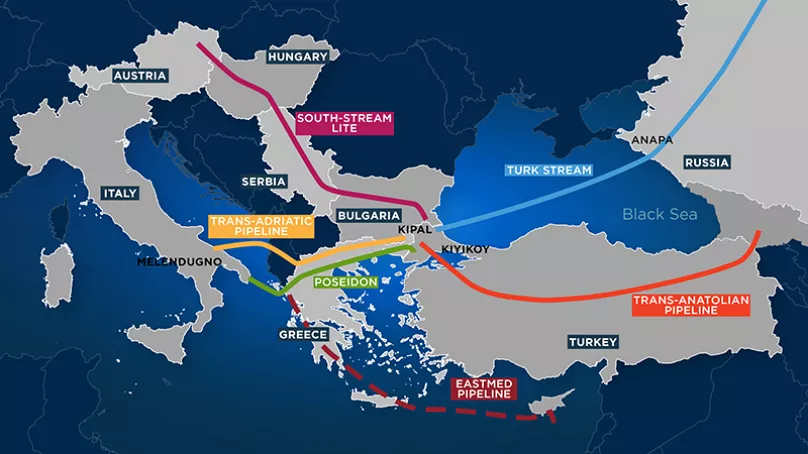“With this move, Europe is shooting itself in the foot.”
“With this move, Europe is shooting itself in the foot.”
On October 15, European Union energy ministers reached a draft agreement to ban Russian energy imports as of January 1, 2028.
For the draft to take effect, it still needs approval from the European Parliament, with the process expected to be completed by the end of the year. Under the proposal, gas imports will only be permitted if companies can prove that the gas, though passing through Russia or Belarus, is produced in another country.
Hungary and Slovakia voted against the bill. Slovak Prime Minister Robert Fico criticized the decision, saying, “A new Iron Curtain is being built.” Both landlocked countries were granted temporary exemptions.
The decision is expected to further deepen Europe’s dependence on Washington in the energy sector.
Why it concerns Türkiye?
The part of the decision that most directly concerns Türkiye is that the TurkStream pipeline, which carries Russian gas to Europe via Türkiye, falls within the scope of this ban.
After the transit agreement between Russia and Ukraine expired on 1 January 2025, TurkStream became the only remaining major pipeline route for Russian gas into Europe.
The document EU energy ministers have agreed upon aims to first limit, then prohibit imports from “third countries”. Here, the document mentions TurkStream:
“The Regulation should therefore presume that natural gas imported into the Union (…) arriving via TurkStream (…) originates in or is exported, directly or indirectly, from the Russian Federation, thus replacing the requirement to submit proof of the country of production. In case it is claimed that natural gas arriving at these borders, interconnectors, or interconnection points is under a ‘transit’ procedure through the Russian Federation, strict controls should apply.”
Undermines the goal of “regional natural gas hub”
In this respect, the decision will undermine Türkiye’s goal of becoming a “regional natural gas hub”. Although the EU aims to reduce its energy dependence on Russia, the amount of gas flowing to EU countries via TurkStream has actually increased in recent months. According to data from January to July 2025, Russia’s gas deliveries to Türkiye, primarily through the TurkStream and Blue Stream pipelines, rose by 26 percent compared to the previous year, reaching 12.7 billion cubic meters. In October 2025, Energy Minister Alparslan Bayraktar said Türkiye has become “Europe’s gas lifeline” through pipelines like TurkStream and TANAP, stressing that Ankara is a “bridge between producers and consumers.”
Halting TurkStream operations has long been a goal for Washington. Former US Secretary of State Mike Pompeo had even signed an agreement with his counterparts in Ukraine on this matter.
Greece in, Türkiye out
On the other side of the Aegean Sea, the Greek press is celebrating the proposed regulation. Greek City Times reports that the regulation was proposed by the Greek energy minister, aiming to “position Greece as a pivotal player in the Euro-American energy axis and reinforcing its ambition to become a regional energy hub.”
Greek Prime Minister Kyriakos Mitsotakis on Friday hailed deepening energy cooperation with the United States, saying Greece is emerging as a key regional hub for natural gas and renewable power, a day after ExxonMobil signed a deal to explore offshore Greek waters for natural gas.
Speaking at the sixth meeting of the Partnership for Transatlantic Energy Cooperation (P-TEC) in Athens, Mitsotakis praised the agreement between ExxonMobil, Energean and Helleniq Energy, saying it would lead to Greece’s first offshore exploration well in 40 years. He said the project reflected Greece’s determination to tap its own resources as Europe seeks to replace Russian gas supplies. Mitsotakis said Europe’s ban on Russian gas “must be enforced,” warning that Moscow’s gas should not “get into Europe through the back door via Türkiye.”
Mitsotakis reiterated Greece’s commitment to the “Vertical Gas Corridor,” a gas transportation scheme linking Greece with Ukraine, Moldova, Slovakia, Bulgaria, Romania and Hungary.
UWI author, historian and political scientist Associate Professor Mehmet Perinçek shared his views on the developments.
Mehmet Perinçek said that the decision will not lead to positive outcomes for Europe: “With this move, Europe is shooting itself in the foot. By giving up cheap and fast energy, it is essentially pushing itself toward more expensive energy, and therefore a higher-cost life and production.”
Hostility towards both Russia and Türkiye
Perinçek emphasized that the move is not “hostility towards Russia, but towards Türkiye as well”:
“This is not just hostility toward Russia, but towards Türkiye as well. It targets Türkiye’s industry, energy security, and economy. This is not the first measure against TurkStream. Before the war in Ukraine, the US signed a memorandum with Ukraine to cooperate against TurkStream. After the war, there have been multiple attempts to sabotage TurkStream pipelines. In fact, Russian intelligence recently indicated that the British were preparing various provocations targeting the TurkStream. The draft prepared by the EU should be seen as a continuation of these actions.”
Regarding the developments in connection with Greece, Perinçek added:
“Making Greece the central hub for energy projects while sidelining Türkiye is also part of the plan. It’s important to note that all of this is connected to the issues from the Eastern Mediterranean to the Cyprus question. These developments also highlight how mistaken the Turkish government’s goal of EU membership is. The EU is actively pursuing projects that target Türkiye’s economy and energy security.”
















Leave a Reply